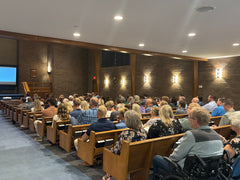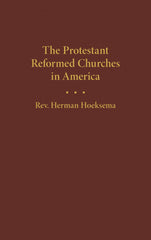Your cart is empty now.

The Bible and Israel (7)
Our last blog post on this subject was May 25, 2018. We have proven from scripture that the New Testament church is the fulfillment of—not the replacement for—Israel. One final chapter requires out attention: it is the greatest chapter in the New Testament dealing with God’s purposes with Israel in the New Testament age, Romans 11. Since Romans 9–11 constitute a unit in the epistle, we summarize the contents of those three chapters of God’s word to demonstrate yet again that the Bible promises salvation only to those who believe in Jesus Christ.
Chapters 9–11 then begin a new section of the epistle in which Paul focuses on God’s sovereign purposes with the Jews and Gentiles.
In Romans 9:1–3 Paul expresses his sorrow at the perishing of so many of his countrymen who are his “kinsmen according to the flesh” (9:3). He lists their many advantages (adoption, glory, covenants, law, service, promises, etc.), chief among which is that Christ was born of them, who is God blessed, forever (9:5).
This leads to a possible objection: if God promised salvation to the Jews, has his promise failed? Is it “of none effect”? Paul answers in the negative—“Not as though the word of God hath taken none effect” (9:6). Paul explains this by means of a very important principle: not all physical descendants of Abraham are true Jews; not all who are outwardly “of Israel” are truly “Israel.” The apostle demonstrates this point by appealing first to Isaac and Ishmael, and second to Jacob and Esau. The difference, says Paul, is in God’s sovereign election. Not only did God elect the nation of Israel, but he also elected within the nation certain individuals.
Paul answers an objection in 9:14: “Is there unrighteousness with God?” After vehemently rejecting the inference with “God forbid,” Paul proves the sovereignty of God in showing mercy to some (9:15) and in hardening others (9:18), illustrating his doctrine with an appeal to Moses and to Pharaoh. A second objection arises in 9:19: “Thou wilt say then unto me, why doth he yet find fault? For who hath resisted his will?” Paul cuts off the objector by reminding him of his place before God as a creature before the Creator (9:20). Paul illustrates the absolute sovereignty of God with the potter and his clay. The potter owns the clay and has power (authority) over the clay. Out of “one lump” (humanity) the potter makes some vessels (vessels of mercy) unto honor, while he makes other vessels (vessels of wrath) unto dishonor. Some vessels are prepared for glory, while others are fitted to destruction. The potter (God) does this because he “is willing to show his wrath and to make his power known” (9:22) and so that he “might make known the riches of his glory” (9:23). To accomplish this twofold purpose of magnifying his wrath and mercy, God endures the reprobate in longsuffering toward the elect (9:22–23).
This is not abstract, because Paul immediately applies it to the reader: “even us, whom he hath called” (9:24), appealing to Hosea 1:10 and 2:23 as proof that the calling of the Gentiles was prophesied in the Old Testament (9:25–26). Peter cites the same passage for the same purpose in 1 Peter 2:10. After quoting some texts from Isaiah as proof that God saves a remnant, Paul concludes that Israel has not attained to righteousness because she sought it “as it were by the works of the law” (9:32). The Gentiles, who did not seek righteousness, have obtained righteousness, “the righteousness which is of faith” (9:30). This was Israel’s fatal stumbling, as they tripped over Christ and perished, as God purposed and as the scriptures foretold (9:32–33; see also 1 Peter 2:6–8).
Paul begins chapter 9 expressing his heartfelt sorrow over Israel’s perishing (9:1–5). He begins chapter 10 in a similar fashion, by expressing his desire for Israel’s salvation (10:1). However, Paul does not excuse Israel for her sin of stumbling at Christ. She has not submitted to God’s righteousness and by seeking salvation in works has missed the goal of the law, which is Christ (10:3–4). This is all the more inexcusable because Moses made it clear that righteousness was not found in the law (10:5). To seek righteousness in the law is, says Paul, to deny the incarnation, death, resurrection, and ascension of Christ, for “it is to bring up Christ again from the dead” or “to bring Christ down from above” (10:6–7). Righteousness then is found only in Christ, and it is through faith in Christ and confession of his name that believers are saved (10:9–10). Paul then explains the necessity of preaching.
If salvation is found only in calling upon the name of the Lord (10:13; Joel 2:32), then a series of questions must be asked. How shall they call on him in whom they have not believed? How shall they believe in him of whom (or whom) they have not heard? How shall they hear without a preacher? How shall they preach, except they are sent? (10:14–15). Thus, Paul sets forth the necessity of preaching for the salvation of the elect. The rest of chapter 10 deals with the unbelieving response of Israel to the preaching: “But they have not all obeyed the gospel? Have they not heard? Did not Israel know?” (10:16–19). Israel did hear and know, but Israel refused (“a disobedient and gainsaying [contradictory] people”) (10:21) and God even prophesied his turning to the Gentiles: “I will provoke you to jealousy by them that are no people, and by a foolish nation I will anger you” (10:19). This is just judgment upon Israel and it is good news for the Gentiles.
In chapter 11 Paul addresses an objection: if the nation of Israel has been rejected with the result that God also saves the Gentiles in one church, has God cast away his people? Chapter 11 is pivotal to understanding God’s purposes with the Jews in the New Testament age. Both premillennial dispensationalism and postmillennialism appeal to this chapter in defense of their doctrine of a future, national conversion of Israel. Although the chapter does not teach that, it does teach that God has promised to save ethnic Israelites in every age of New Testament history until the return of Christ. That promise is quite remarkable because it pertains to no other nation: God does not save Irishmen, Germans, Filipinos, or Americans in every age. While many of the proud nations of the Old Testament (the Philistines, Moabites, Edomites, etc.) have ceased to exist and (very likely) New Testament nations will cease to exist, God has preserved a remnant of ethnic Jews in the world. This does not mean that God will save all or even all ethnic Israelites, but he will save a remnant in every age, a remnant “according to the election of grace” (11:5) until the fullness of Israel is brought in, so that “all Israel shall be saved” (11:25).
However, he will save ethnic Jews in exactly the same way in which he saves ethnic Gentiles—by faith in Jesus Christ.
Paul answers the initial objection (“Hath God cast away his people?”) with a firm “God forbid” (11:1), illustrating the faithfulness of God’s promises to his foreknown people in his own (Paul’s) case (“I also am an Israelite”) and in the case of the remnant preserved in Elijah’s day (11:4; I Kings 19), and concluding that “at this present time also there is a remnant [of ethnic Israelites] according to the election of grace” (11:5). Gracious election and righteous reprobation operate in Israel as well as in other nations. Thus even within Israel, “the election hath obtained it, and the rest were blinded” (or hardened) (11:7). Paul proves that God hardens some (even the majority of) Israelites from Psalm 69, which Psalm even teaches the fearful truth that God hardens the reprobate by means of their earthly prosperity (“Let their table be made a snare,” etc.).
This leads to another objection concerning God’s hardening of the reprobate: “Have they stumbled that they should fall?” (11:11). Paul’s answer is “God forbid,” for God’s purpose in reprobation is much greater than merely the damnation of the wicked. In inscrutable wisdom and awesome power, God ordains the hardening of the [reprobate] Jews for the salvation of the [elect] Gentiles.
...to be continued
___________
This post was written by Rev. Martyn McGeown, missionary-pastor of the Covenant Protestant Reformed Church in Northern Ireland stationed in Limerick, Republic of Ireland.
_____________
Other articles:
The content of the article above is the sole responsibility of the article author. This article does not necessarily reflect the opinions and beliefs of the Reformed Free Publishing staff or Association, and the article author does not speak for the RFPA.

Donate
Your contributions make it possible for us to reach Christians in more markets and more lands around the world than ever before.
Select Frequency
Enter Amount










